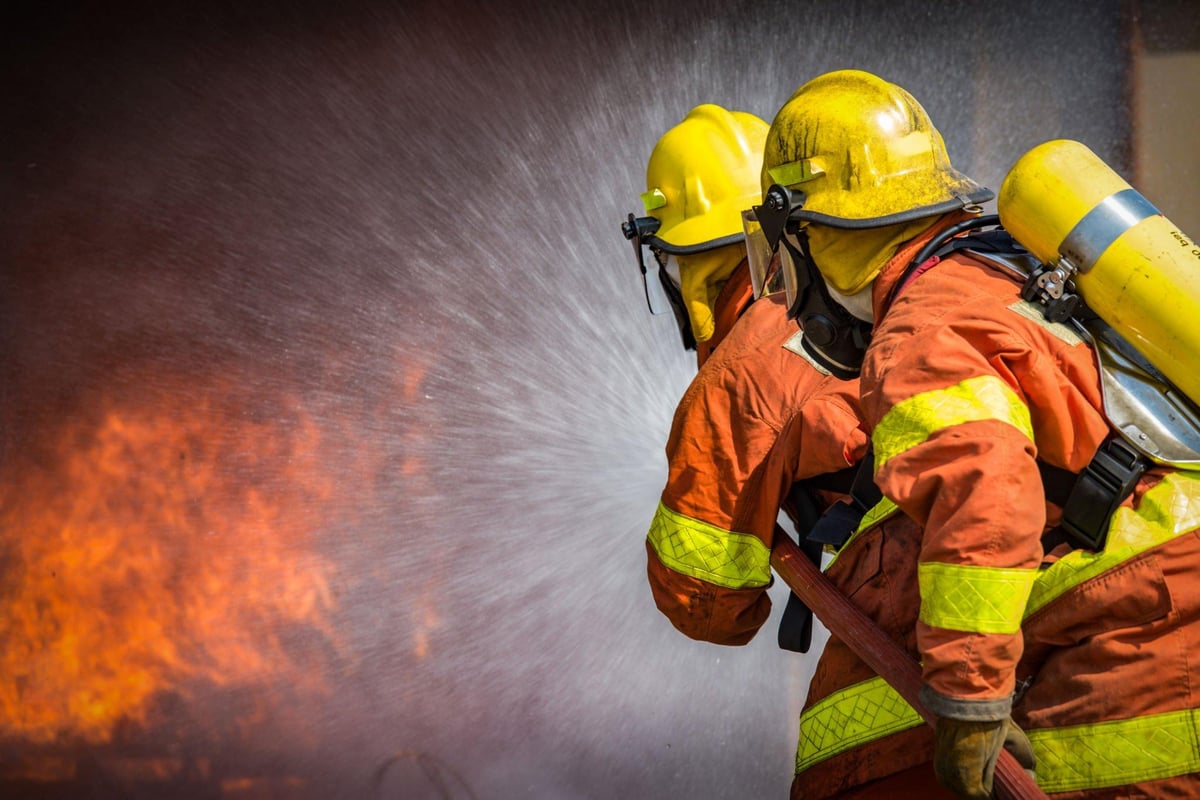Fire Science classes near me in Charleston
In the Charleston metro area, the average cost of a class is $11500 and the average class length is approximately 35 weeks long
Trade and industry classes near
Charleston, SC 29401Online classes
Financial aid
Certificate
Short classes

Liberty University Online
BS: Civil Engineering
- Online, completion in as little as 42 months.
- Option to transfer credits for up to 75% of the entire degree.

Liberty University Online
BS: Aviation Management
- Online, completion in as little as 42 months.
- Option to transfer credits for up to 75% of the entire degree.

Waldorf University
AA Occupational Safety & Health
- Online, estimated completion in 2 years for full-time students
- Covers industrial hygiene, occupational safety, and more
Fire Science classes near me in Charleston
Are you interested in a career in firefighting? If so, you may be wondering where you can find fire science classes near you in Charleston. Fire science is a specialized field that combines both theoretical knowledge and practical skills to prepare individuals for a career in firefighting and fire prevention. In this blog post, we will explore what fire science is, the training requirements, what to look for in a fire science class, what to expect from the day-to-day class, the certification process, how to find related jobs, and what other classes you can take after becoming a fire science professional.

What is Fire Science?
Fire science is the study of fire behavior, prevention, and suppression. It involves understanding the chemistry of fire, fire safety regulations, and the techniques and equipment used in firefighting. Fire science professionals play a crucial role in protecting lives and property by preventing, controlling, and extinguishing fires.
Training Requirements
To become a firefighter or pursue a career in fire science, you will need to complete the necessary training and education. The specific requirements may vary depending on the state and department you wish to work for, but generally, the following steps are involved:
-
High School Diploma or GED: Most fire science programs require applicants to have a high school diploma or equivalent.
-
Physical Fitness Test: Firefighters need to be physically fit and able to perform physically demanding tasks. Many fire science programs require applicants to pass a physical fitness test as part of the admission process.
-
Fire Academy: Once accepted into a fire science program, you will undergo training at a fire academy. This training typically includes both classroom instruction and hands-on practical exercises.
-
EMT Certification: Many fire departments require firefighters to have Emergency Medical Technician (EMT) certification. EMT training can be completed as part of your fire science program or separately.
-
On-The-Job Training: After completing your fire science program and obtaining any necessary certifications, you will likely undergo additional on-the-job training and probationary periods before becoming a fully qualified firefighter.
What to Look for in a Fire Science Class
When searching for fire science classes near you in Charleston, there are several factors to consider to ensure you find the right program for your needs:
-
Accreditation: Choose a fire science program that is accredited by a recognized accrediting body. Accreditation ensures that the program meets certain quality standards and that your education will be recognized by potential employers.
-
Experienced Instructors: Look for programs with instructors who have real-world experience in firefighting or related fields. Instructors with practical experience can provide valuable insights and knowledge.
-
Hands-On Training: Firefighting is a hands-on profession, so it's important to choose a program that offers plenty of practical training opportunities. Look for programs that provide access to a fire training facility or offer internships with local fire departments.
-
Job Placement Assistance: Consider programs that offer job placement assistance or have partnerships with local fire departments. This can help increase your chances of finding employment after completing your training.
-
Class Schedule: Check the class schedule to ensure it fits your availability. Some programs offer evening or weekend classes to accommodate students who may be working or have other commitments.
What to Expect from the Day-to-Day Class
Fire science classes are typically a combination of classroom lectures and hands-on training. Here's what you can expect from the day-to-day class:
-
Classroom Lectures: In the classroom, you will learn about fire behavior, fire prevention, fire safety regulations, firefighting techniques, and the use of firefighting equipment. You may also study subjects such as building construction, hazardous materials, and incident command systems.
-
Practical Training: Hands-on training is a crucial part of fire science education. You will have the opportunity to practice using firefighting equipment, conducting search and rescue operations, performing ventilation techniques, and extinguishing different types of fires.
-
Teamwork and Communication: Firefighting is a team effort, so you can expect to work closely with your classmates during training exercises. Effective communication and teamwork skills are essential in this profession.
-
Physical Fitness Training: Firefighters need to be physically fit to perform their duties. Expect physical fitness training as part of your fire science program, which may include exercises such as running, climbing stairs, and lifting heavy objects.
Certification Process
After completing your fire science program, you will need to obtain the necessary certifications to work as a firefighter. The specific certifications required may vary depending on the state and department you wish to work for. Here are some common certifications:
-
Firefighter I and II: These certifications are typically obtained through the state fire academy and demonstrate your competency in basic firefighting skills.
-
EMT Certification: As mentioned earlier, many fire departments require firefighters to have EMT certification. This certification allows you to provide emergency medical care at the scene of an incident.
-
Hazmat Certification: If you are interested in responding to hazardous materials incidents, you may need to obtain a Hazmat certification. This certification demonstrates your knowledge and skills in handling hazardous materials.
How to Find Related Jobs
Once you have completed your fire science training and obtained the necessary certifications, you can start looking for firefighting jobs. Here are some resources to help you in your job search:
-
Local Fire Departments: Check the websites or contact local fire departments in Charleston for job postings and application information.
-
Job Search Websites: Use popular job search websites like Indeed, Monster, and LinkedIn to search for firefighting positions in your area.
-
Networking: Reach out to professionals in the fire service industry and attend job fairs or networking events to make connections and learn about job opportunities.
Other Classes to Consider
Once you have established your career as a fire science professional, there are additional classes you can take to advance your skills and knowledge. Some options include:
-
Advanced Firefighting Techniques: These classes focus on advanced firefighting tactics, such as high-rise firefighting, wildland firefighting, and technical rescue.
-
Fire Inspector/Investigator Training: If you are interested in fire prevention and investigation, consider taking classes to become a certified fire inspector or fire investigator.
-
Leadership and Management: As you progress in your career, leadership and management skills become increasingly important. Look for classes or workshops that focus on leadership development for firefighters.
Final Thoughts
Fire science classes provide the necessary training and education to pursue a rewarding career in firefighting. By completing a fire science program, obtaining the required certifications, and staying updated with ongoing training, you can embark on a path that allows you to protect lives and property.
Check out Dreambound's extensive guides focusing on the unique challenges and requirements for each city in the US. For more detailed information, see some of our other guides below.
- How to Become a Firefighter in District of Columbia
- How to Become a Firefighter in Georgia
- How to Become a Firefighter in Michigan
- How to Become a Firefighter in Oklahoma
- How to Become a Firefighter in South Carolina
Contemplating a transition in your career or exploring various professional paths? Dreambound has written many guides to help you in making informed decisions. Here are a few:
FAQ
What is Dreambound?
Dreambound is the largest platform for students to find career & technical training programs. While we can't guarantee a career outcome, our mission is to provide all the information you need to find the perfect program for you.
What programs do you offer?
Dreambound has over 70 programs across healthcare, technology, business, and industrial trades. This includes programs such as Medical Billing, Cybersecurity, and welding.
Do you offer financial aid?
Some of our schools offer financial aid for those who qualify. Many others offer payment plans, where you can pay the cost of class over time.
Is it possible to do online classes?
Yes, Dreambound offers many online programs. On Dreambound's search, you can filter by online, in-person, and hybrid (part online, part in-person).
